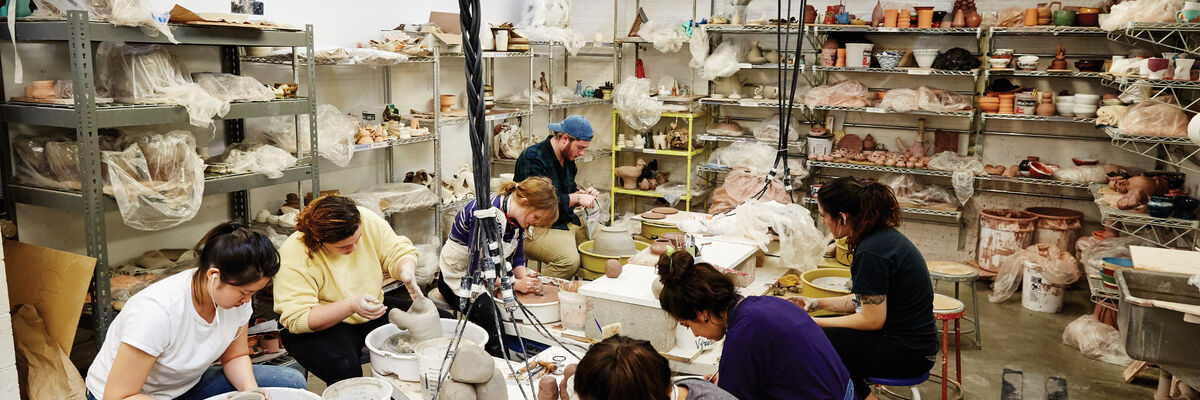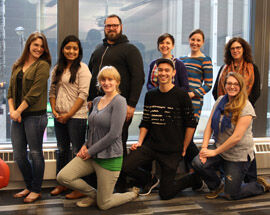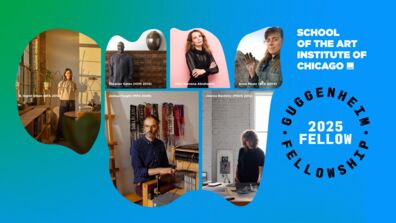
Funding the Future of Arts Administration

by Jeremy Ohmes
A trip to Paris to conduct thesis research on an annual arts festival. A symposium and related publication on arts administration at a Chicago gallery. A trip to Los Angeles for research on a Latino theater festival. Students in SAIC’s Master of Arts (MA) in Arts Administration and Policy program engage in projects like these in order to further and focus their fieldwork into cultural policy and institutional practice. Traveling for research, attending conferences, producing publications, and curating exhibitions are essential for Arts Administration and Policy students to interact with current debates.
The SAIC Enrichment Fund is a student-run initiative that provides financial support each semester for graduate student projects. Founded in 2006 by a group of Arts Administration students, the Fund seeks to not only encourage research and offset costs, but to prepare students with the experience of applying for grants and evaluating applications.
Rachel Weiss, Arts Administration Professor and spring semester faculty advisor for the Enrichment Fund, says, "One of the great mysterious zones of working in the arts is figuring out what goes on in funders’ heads. This initiative helps demystify that process.”
In addition to a faculty advisor, the Fund is currently managed by a rotating board of six Arts Administration and Policy students, emeritus board member Laura Trejo (MA 2013), and alumni advisor Katie Kurcz (MA 2009). Kurcz agrees that the program is valuable as an experiential learning opportunity as well as a means for supporting innovative student work. She notes, "The Fund is a great tool for modeling real-world issues, and the quality of grant proposals this semester was remarkable.”
According to board members Gan Uyeda (Dual MA 2014) and Ann Meisinger (Dual MA 2014), a grant writing workshop as well as a revamp of the application material has led to more engaging and diverse cases for funding. Uyeda says, "We expanded the part of the application where students can talk about their project and opened up the budget section—instead of asking for an itemized budget. This has helped in terms of having space to articulate how students are thinking about the viability of their projects and what they would do with a grant.”
Abigail Satinsky (Dual MA 2009) received an Enrichment Fund grant for her research group InCUBATE, which explores new approaches to arts administration and curates, researches, and co-produces artists’ projects. At the time InCUBATE was organizing exhibitions in five cities in addition to a Sunday Soup Café in New York City as part of Creative Time’s year-long Democracy in America: The National Campaign exhibition. The grant helped send InCUBATE and its collaborating artists to New York and it was a vote of confidence from SAIC’s Arts Administration and Policy department.
The Enrichment Fund grants range anywhere from $20 to $1,000, depending on the number of projects the student board decides to fund. This past spring 2013 semester the board provided financial support for four Arts Administration and Policy students: one who is attending a conference related to her thesis; one who is doing research on small, roadside museums; one who is producing a local film festival; and one who is establishing a community project in Gary, Indiana, focusing on issues of urban development and arts.
The initial board raised more than $25,000 to set up an endowment for the Fund. Since then the students on the board have engaged in various forms of fundraising, from letter-writing campaigns to online appeals. And what will donors get out of giving money to the Enrichment Fund? "A deep sense of pride and immense gratitude,” says Uyeda, as well as the knowledge that they are contributing to the success of the next generation of critically engaged, culturally integral scholars and arts administrators.
